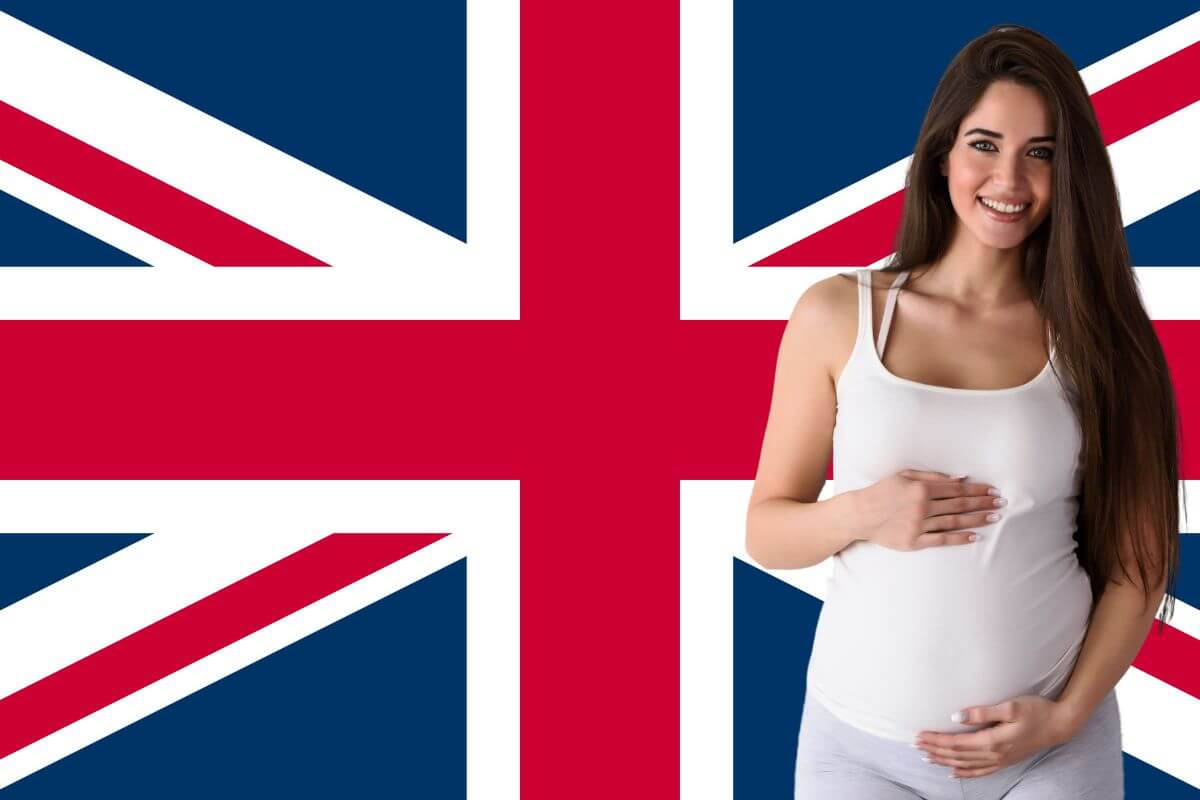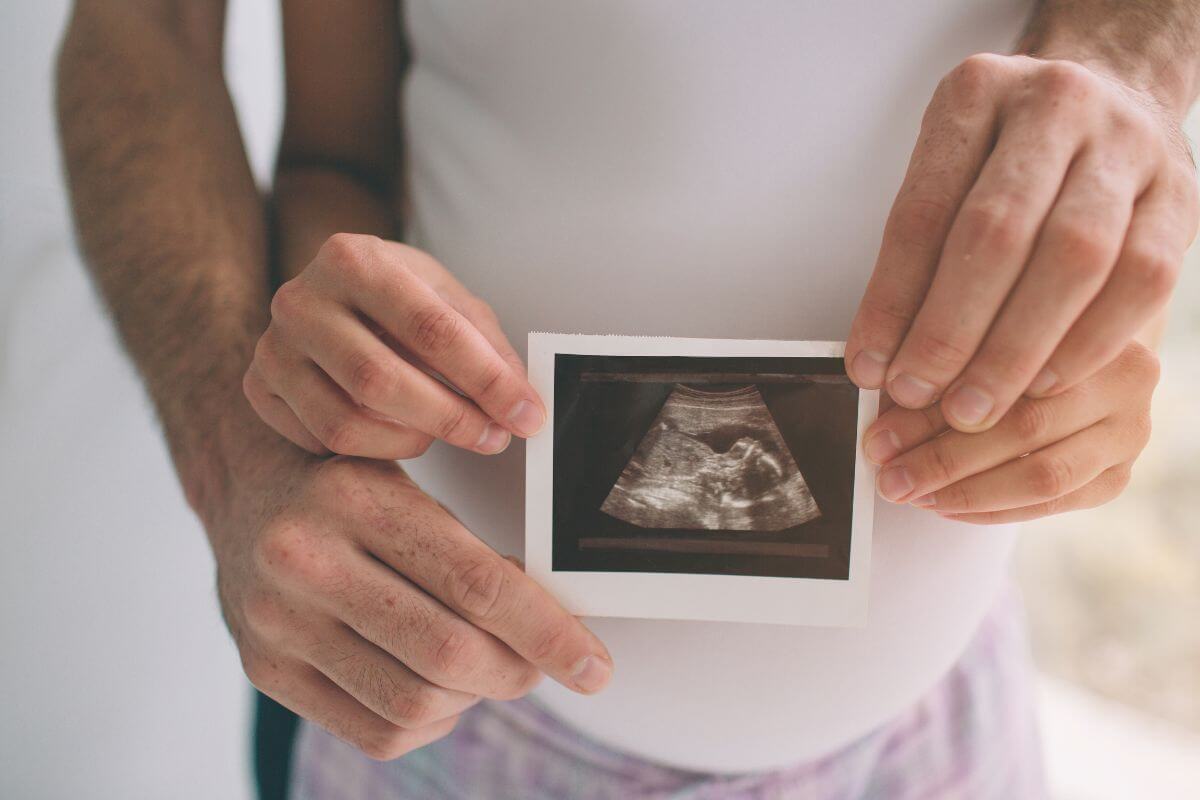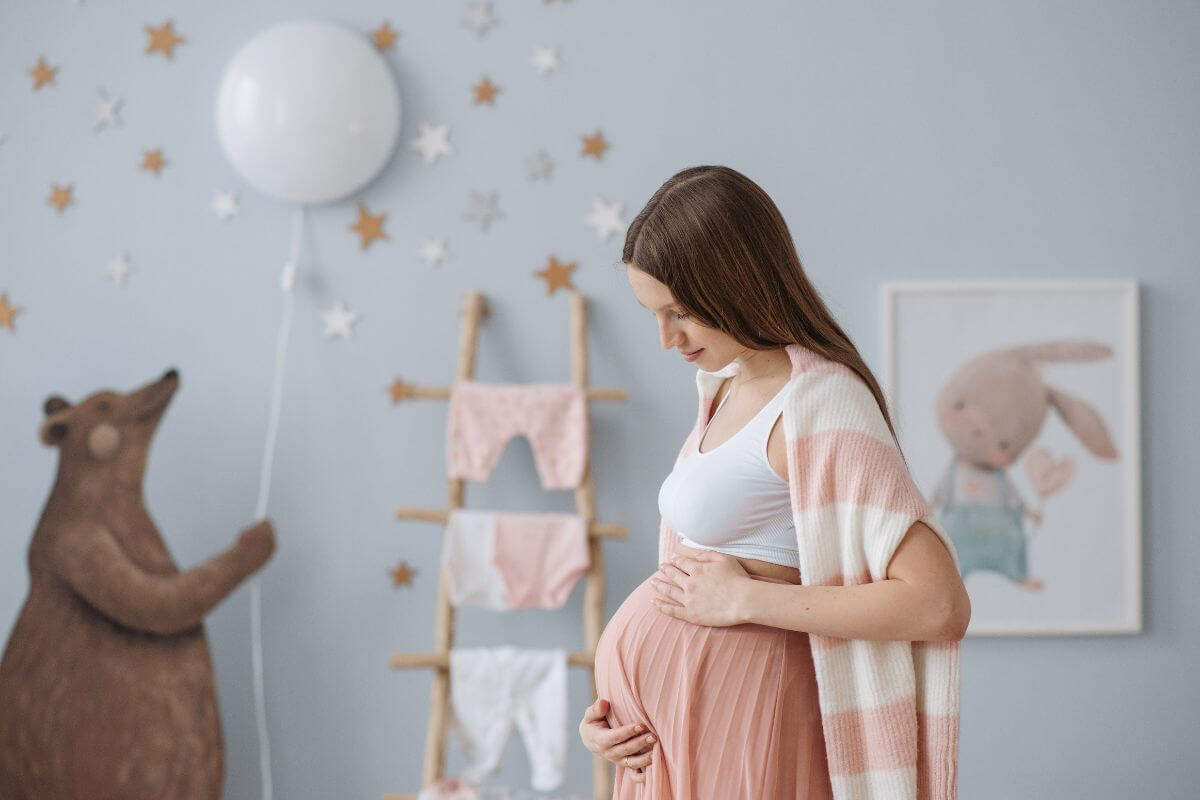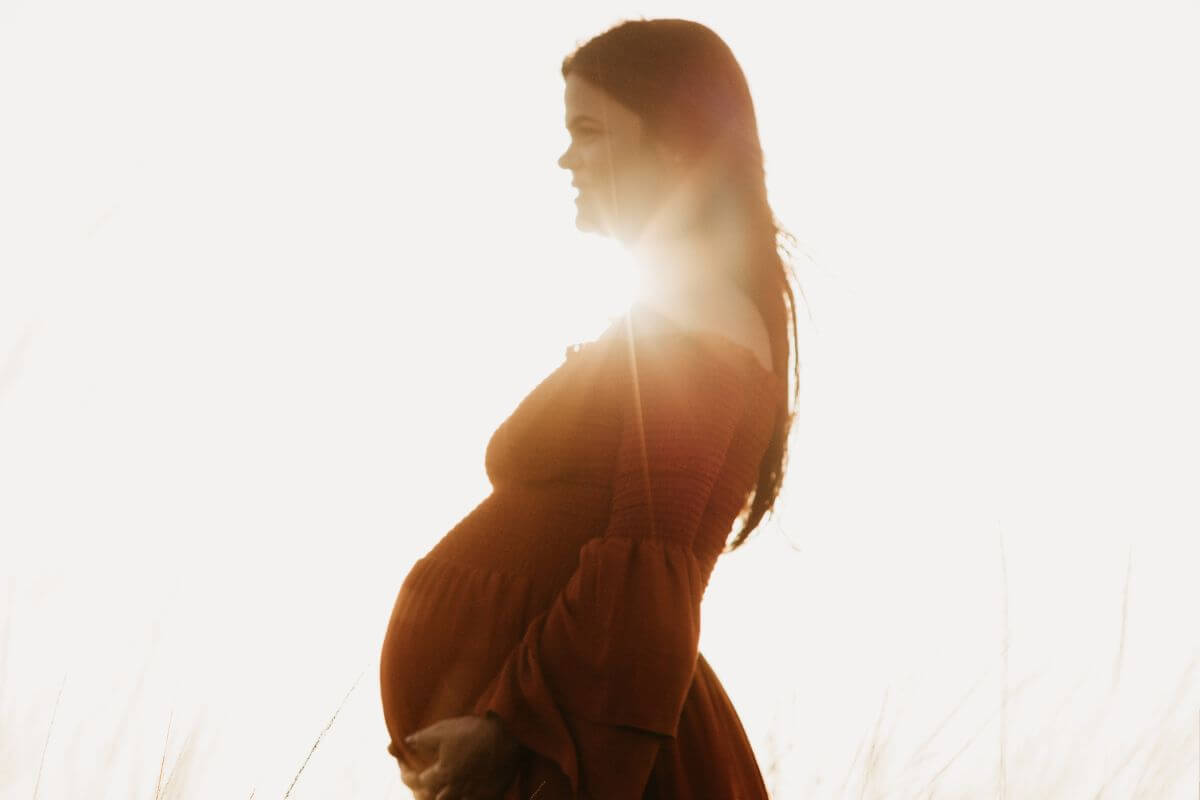Pregnancy is something which, for a very long time, was really only talked about in euphemism.
It was not something that was openly discussed or even really very well understood.
Even today, while we have shed a lot of this old-fashioned prudishness, we retain a lot of different slang terms for being pregnant.
Britain is no exception to this rule and has a great many slang terms for being pregnant.

British Slang For Pregnant
The British have a rich history of slang and colloquialisms, especially when it comes to describing certain conditions or situations.
Pregnancy, a universally understood condition, is no exception.
Over the years, Brits have come up with numerous playful and sometimes quirky terms to describe being pregnant.
Some of these terms have historical roots, while others are more modern adaptations.
Let’s delve into some of these unique British slang terms for pregnancy.
Preggers

Starting off with a couple of simple ones, first we have “preggers”.
This is a very common slang term used among the younger generations today, although it has been adopted more and more by their parents over time.
It’s not a particularly polite way to refer to pregnancy so be careful where you use this one.
The reason it is used among youth today is not that it is a new term, but simply because adults can feel childish using it.
In fact, this term goes back to at least the middle of the 20th Century, being first recorded in 1942.
It is and has been a common convention in British slang to shorten a word and add an -er suffix, so the origin is not much more complicated than that!
Preggo

Similarly, another slang term used in Britain for pregnancy is “preggo”.
Functionally, this one is virtually identical to “preggers”.
It’s used among younger people, or simply in more comfortable and informal settings among adults.
Don’t go throwing this one around with people you don’t know very well–again, it’s far from polite!
Preggo was originally an Australian slang term, first being recorded in 1951.
In the same way that -er suffixes are a common convention for British slang, so too were -o suffixes for Australian slang.
Among the British today, though, preggo is just as widely understood as preggers.
Up the duff

Next we have “up the duff,” a common slang term used in Britain to refer to pregnancy.
Again, this one is not only in itself somewhat impolite to use but “duff” can have a couple of other meanings, too, so don’t go throwing this one around in unfamiliar settings.
It’s typically used in contexts where the pregnant person is not present.
The origin of this phrase is not known for certain.
Though widely used in Britain today, it’s another one that was originally Australian, according to the OED.
The leading theory is that it relates to the phrase “in the pudding club,” which we will look at later.
“Duff” is a type of pudding, so it’s possible it refers to the way puddings rise in the oven.
It goes back at least as far as the 18th Century, but even then “duff” had a variety of slang meanings.
Up the pole

“Up the pole” is another way to say that someone is pregnant in British slang.
This one can also have a couple of different meanings, and some in Britain may more commonly use the term to simply mean “mad”, as in “he’s driving me up the pole”.
However it is certainly understood in this sense, too, and widely used.
That said, it is not as widely used in Britain as some of the other terms on this list.
Originally, and still today, this phrase was used more commonly in Ireland than Britain.
It’s recorded as far back as the 1880s, and though the etymology is not certain, it’s believed that it relates to the awkward position that being pregnant can put you in.
“Up the pole” usually refers to unplanned, and even awkward and unwanted, pregnancies.
Eating for two

Next we have “eating for two,” a fairly self-explanatory slang phrase meaning someone is pregnant.
This one is often used as a way of revealing a pregnancy to friends and family.
It’s certainly more polite but again you do want to be careful when using this one as it could be easily misconstrued as a comment on someone’s weight or eating habits.
It’s a euphemistic way of revealing the news.
Of course, the phrase is not at all literal.
Pregnant women do not need to “eat for two”–they only need a few hundred extra calories to stay healthy during the pregnancy.
Most people do not understand the phrase to be literal though it’s important to make that clarification nonetheless.
When this one started being used is not clear, although it does not appear to be older than the middle of the 20th Century.
Expecting

Another very common expression, if a little dated, for being pregnant is to say you are “expecting”.
This is widely used to mean someone is pregnant.
It’s another sort of a euphemism, one that slightly skirts around the issue of what is actually being discussed.
It’s less likely you’ll hear this one today than some of the others on this list, but it is definitely still used despite its age.
The earliest written example we have of this term comes from 1817 used in this way.
The word itself comes from Latin, but in any case the 19th Century was the ripest time for these sorts of euphemisms.
Discussing pregnancy in clear terms was highly taboo, so phrases like “expecting” were very commonly used and have been passed down to us today.
In the pudding club

As mentioned earlier, another way you might describe someone as pregnant is to say they are “in the pudding club”.
Again, you want to be very careful with how you use this one.
Not everyone will understand that it refers to pregnancy, and you’ll doubtless agree it could certainly be taken as a comment on someone’s weight if they weren’t familiar with the expression!
The phrase is thought to originate from the way the pregnant belly swells up over the course of the pregnancy.
This is related to the way that traditional puddings rise as they are cooked much like a pregnant woman’s belly.
Others think it may in fact relate to the dialectical word “pod”, meaning belly. We don’t know for sure, but it’s been in use for some time.
In the family way

Another somewhat old fashioned but still widely used slang term for being pregnant is “in the family way”.
This one is fairly self-explanatory, and generally used only for a person’s first pregnancy and not for any of their subsequent pregnancies.
You may get some odd stares if you use this one today depending on who you are talking to.
It’s generally a good idea to avoid discussing someone’s pregnancy if you don’t know them very well or certainly if you aren’t completely sure they are pregnant–but this one is perhaps a bit more polite than others.
Plainly another euphemism, this term dates back to at least the late 18th Century.
The sense is simply that when you get pregnant you are starting a family.
It can be used in a somewhat jocular way, pointing out the fact that someone has lost part of their freedom by becoming pregnant and having to care for children.
With child

Certainly a very old fashioned term but one you may nevertheless still hear today is “with child”.
This is a clear term meaning that someone is pregnant and has been in use for a very long time.
Again, you may well be met with some confused stares if you use this one, depending on the context.
Most would consider this to be old fashioned, but it’s far from entirely out of use.
This euphemism has been in use since at least the 17th Century, and we can see it used in Shakespeare.
It is most likely a medieval term, but we don’t have a great deal of written records pointing out its precise origin. It has similar parallels in other languages.
Pea in the pod

Finally, we have “pea in the pod,” a common slang expression in Britain meaning someone is pregnant.
It’s fairly intuitive so most people will understand what you mean when you say this, although it’s not as widely used as some of the other slang phrases on this list.
This one is of unclear origin, though the meaning is obvious.
Peas come in “pods” when they are harvested, making the “pod” the pregnant person and the “pea” the baby.
It doesn’t seem to be much older than the last century or so, but it’s hard to say for sure.
We’ve certainly moved on from the days of never being able to refer to pregnancy for what it really is.
Nevertheless, we haven’t lost the colorful and interesting language used to describe pregnancy.
The British always excel at slang of this kind, and as you can see have more than a few ways to describe pregnancy.
More in British Slang
- British Slang For Alcohol
- British Slang For Angry
- British Slang For Argument
- British Slang For Bad
- British Slang For Boss
- British Slang For Boy
- British Slang For Breasts
- British Slang For Butt
- British Slang For Car
- British Slang For Cat
- British Slang For Child
- British Slang For Cigarette
- British Slang For Coffee
- British Slang For Cold
- British Slang For Cool
- British Slang For Delicious
- British Slang For Diarrhea
- British Slang For Dog
- British Slang For Drunk
- British Slang For Easy
- British Slang For Expensive
- British Slang For Eyes
- British Slang For Face
- British Slang For Fat Person
- British Slang For Fist Fight
- British Slang For Flatulence
- British Slang For Food
- British Slang For Friend
- British Slang For Girl
- British Slang For Glasses
- British Slang For Going To Bed
- British Slang For Good
- British Slang For Good Luck
- British Slang For Goodbye
- British Slang For Gossip
- British Slang For Grandmother
- British Slang For Gun
- British Slang For Hair
- British Slang For Happy
- British Slang For Head
- British Slang For Helicopter
- British Slang For Hello
- British Slang For Horny
- British Slang For House
- British Slang For Hungry
- British Slang For Hurry Up
- British Slang For Husband
- British Slang For Idiot
- British Slang For Jail
- British Slang For Jerk
- British Slang For Job
- British Slang For Kiss
- British Slang For Knife
- British Slang For Loser
- British Slang For Lover
- British Slang For Lying
- British Slang For Menstruation
- British Slang For Money
- British Slang For Motorcycle
- British Slang For Mouth
- British Slang For No
- British Slang For Nonsense
- British Slang For Nose
- British Slang For Pajamas
- British Slang For Party
- British Slang For Police
- British Slang For Poor
- British Slang For Potato
- British Slang For Pregnant
- British Slang For Rain
- British Slang For Relax
- British Slang For Rich
- British Slang For Sailor
- British Slang For Sandwich
- British Slang For Scared
- British Slang For Sexy
- British Slang For Shoes
- British Slang For Silly
- British Slang For Soldier
- British Slang For Stomach
- British Slang For Surprised
- British Slang For Tea
- British Slang For Teeth
- British Slang For Telephone
- British Slang For Television
- British Slang For Testicles
- British Slang For Thank You
- British Slang For Thief
- British Slang For Tired
- British Slang For Toilet
- British Slang For Umbrella
- British Slang For Vacation
- British Slang For Vomit
- British Slang For Walking
- British Slang For Weird
- British Slang For Wife
- British Slang For Wonderful
- British Slang For Work
- British Slang For Yes
- British Slang Insults
- British Slang Quiz

